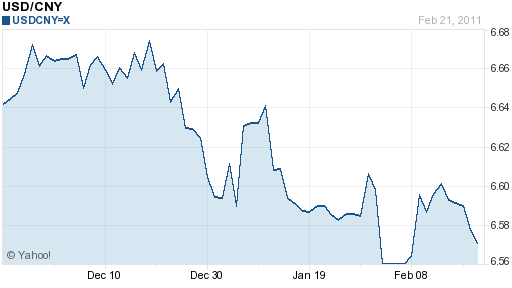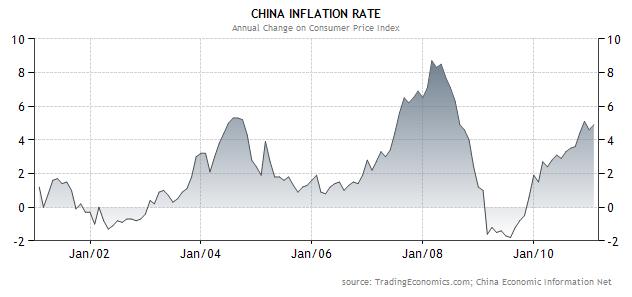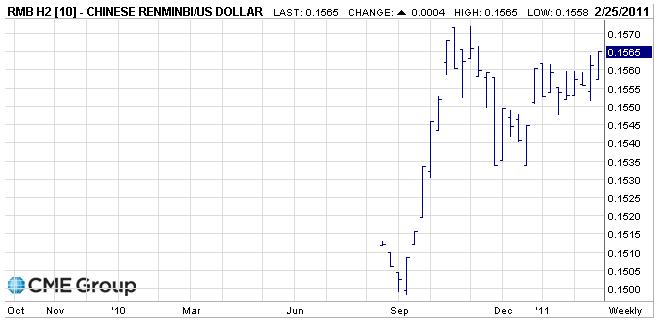Forex Blog |
| Chinese Yuan: Further Appreciation is Inevitable Posted: 22 Feb 2011 08:47 AM PST Relatively speaking, the Chinese Yuan has been on a tear, appreciating ~1% in a little more than a month. One has to wonder whether this is a concession by the People’s Bank of China (PBOC) that its exchange rate regime is not viable or whether its instead a political sop. The question on everyone’s minds, of course, is, will it continue?
However, it was only when fellow emerging market economies – namely Brazil – voiced similar concerns, that China was finally forced to concede partial defeat. It signed on to an official G20 communique that declared that exchange rates and current account balances would be used to determine whether a particular country’s policies were contributing to global economic imbalances. Alas, the Communique (and the G20, for that matter) is deliberately vague and unenforceable; it’s more symbolic than anything else. Still, China is not one to take its cues – especially on issues as important as the Yuan – from the international community. That the Yuan is now appreciating at a steady clip (~5% in annualized terms) is almost certainly being driven more by pragmatism than politics. Specifically, it represents the most effective tool to combat inflation, which has already breached 5% and continues to tick higher. China critics forget that China’s fixed exchange rate regime is not a free lunch. While it almost certainly gives the export sector a competitive advantage, it also deprives the PBOC of the ability to conduct monetary policy and is inherently inflationary. That’s because the policy necessitates soaking up all of the foreign currency that enters the country (hence the ~$3 Trillion in forex reserves) and instead printing new Chinese Yuan and putting into circulation. When you combine a 15% annual increase in the money supply with soaring economic growth, a surge in bank lending, real estate boom, and rising commodity prices, the inevitable result is inflation. The country’s economic officials have responded by tightening credit and raising interest rates, but these will ultimately fail as long as the Fed’s QE2 program continues to send US Dollars into China. In addition to allowing the Yuan to slowly appreciate, China has also moved to make the Yuan more convertible. This has the dual advantages of making China less reliant on the US Dollar and on relieving upward pressure on the Yuan. More of its trade is being settled directly in Chinese Yuan. Chinese companies are being encouraged to invest outside of China, and foreign companies inside of China are gradually being permitted to issue Yuan-denominated bonds, rather than import Dollars to fund new investments. It appears that all of these measures are actually starting to have some impact. China’s trade surplus is shrinking. The IMF has suggested that the Chinese Yuan could one day be an international reserve currency and could be a component of its Special Drawing Rights (SDR) currency. Less hot money (distinct from investment inflows) is finding its way into China. Unfortunately, most analysts are skeptical that it will last. Futures markets reflect a modest 2.5% appreciation against the Dollar over the next 12 months. I’m personally anticipating a rise of 4-5%, though I think it will ultimately be tweaked depending on inflation.  |
| You are subscribed to email updates from Forex Blog To stop receiving these emails, you may unsubscribe now. | Email delivery powered by Google |
| Google Inc., 20 West Kinzie, Chicago IL USA 60610 | |




No comments:
Post a Comment